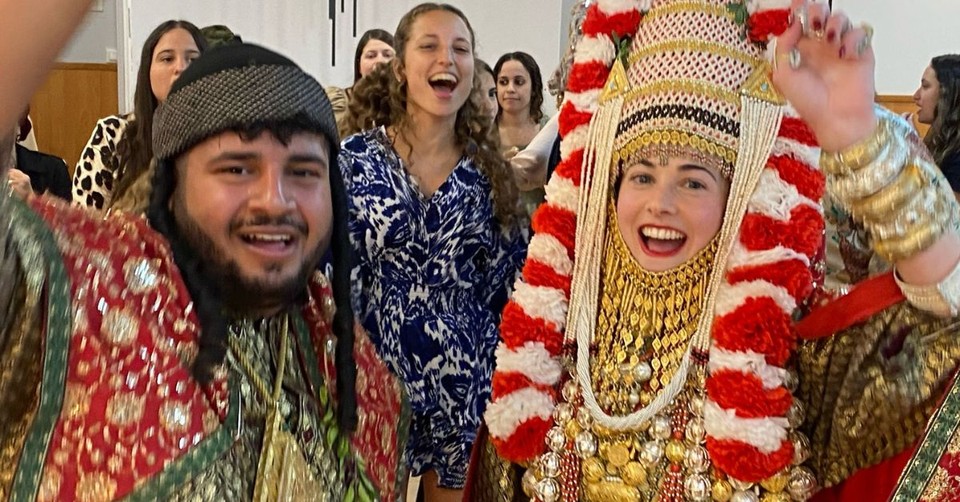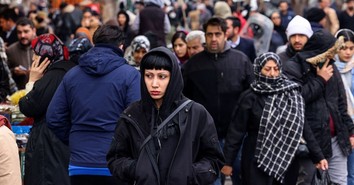Celebrate a Jewish Wedding Streaming Live from Israel

This coming Monday, May 19, I will be blessed to be celebrating the marriage of my fourth daughter, Avital, to Eliya, in the desert mountains outside of Jerusalem. As the excitement builds up, I want to invite you to join us, to be part of our celebration. Of course, every wedding is joyous, but if you've never been to a traditional Jewish wedding or experienced that, especially here in Israel, you're not going to want to miss it. There's something remarkable in a traditional Jewish wedding that most Christians, specifically, and non-Jews, in general, have never experienced.
There are many unique aspects of a traditional Jewish wedding, including Biblical roots and customs going back thousands of years, connecting us to generations past and specifically in the Land of Israel. The wedding will be streamed here on Monday, May 19, from 11:30 am Eastern time, with friends commenting who are unable to join us in person, joining virtually to highlight some of the unique aspects of the wedding so you'll understand what's going on.
Here's a short overview:
- Before the ceremony, a marriage contract, the ketubah is signed, outlining the groom's responsibilities to the bride. This formal document legally binds their marriage, in Aramaic text that has been the same for thousands of years.
- After signing the ketubah with two witnesses, Eliya will be escorted by me and his father, and danced in along with dozens of friends and family, to see Avital, who will be surrounded by my wife, Eliya's mother, all their sisters, bride's maids, and many more. This is often the first time the couple will have seen one another in a week. They will have a quiet moment together amid hundreds of celebrants, receive blessings from their parents and grandparents, and he will place the veil over Avital's face, bringing in Biblical reminders of Leah and Rachel, just to make sure I don't switch Avital for one of her sisters.
- The wedding ceremony will take place under a canopy called a chuppah, with four open sides symbolizing the couple's new home and God's presence. In our case, the top of the chuppah will be made of the tallit, prayer shawl, of Avital's maternal great, great grandfather, as we have used it for our own wedding 33 years ago, and our other married children.
- Under the chuppah, Avital will circle Eliya seven times, a ritual symbolizing protection, unity, and the building of a spiritual wall around the marriage, affirming that they are actively choosing to center one another's lives around each other.
- The ceremony includes seven unique blessings, Sheva Brachot, recited over wine, focusing on creation, joy, and the couple's union, which are unique to Jewish liturgy. Different people will be invited to take part in invoking these blessings, In our case, this will be a blend of the traditions of our respective families, specifically with Eliya's relatives bringing in traditions from his family's Jewish Yemenite background as the ingathering of the Jewish people from the four corners of the world.
- The ceremony is divided into two parts—kiddushin (betrothal) and nisuin (marriage)—marked by separate blessings, and Eliya giving Avital a ring. Two witnesses will affirm he places the ring on her finger, saying in Hebrew, "With this ring, you are consecrated to me in accordance with the laws of Moses and the people of Israel." This will be followed by cheers, singing, and dancing. Unlike Western/Christian weddings, where the bride and groom exchange vows, and someone "pronounces" them husband and wife, this is what affects their being married.
- Because my family is native English speakers, some of the ceremony will be translated into English. However, the ceremony is conducted primarily in Hebrew or Aramaic, which is also a custom that goes back thousands of years.
- Another thousand-year-old tradition is that Eliya will break a glass, as a reminder of the destruction of the Temple, while singing the verse from Psalms 137, "If I forget you, O Jerusalem, let my right hand lose its strength." Also, during the ceremony, the rabbi will place ash from the destruction of the Temple on Eliya's head. These symbolize that even in our most joyous occasions, we pray and yearn for Jerusalem and the Temple to be rebuilt, and that our lives remain incomplete without it.
- After the ceremony, Avital and Eliya will be danced out by friends and family, spending a brief period alone in private, yichud, symbolizing their new intimacy as husband and wife. As they begin their marriage together, the party will begin.
- The wedding meal (seudah) will not just be a lavish multi-course meal, but also include specific rituals like additional blessings and lively dancing. Traditionally, the men and women will dance separately, where, unlike modern social dancing, Eliya and Avital will be at the center of concentric circles of dancing, literally being in the middle of the celebration. There will be lively dancing and additional fun, which are meant to bring extra joy to the bride and groom on this, their happiest day.
These are just some of what is in store. Even if virtually, the experience will be unparalleled. Please join us in celebrating as we sing from Jeremiah 33:10-11, "Yet again there shall be heard, in the cities of Judah, and in the streets of Jerusalem. The voice of joy and the voice of gladness, the voice of the bridegroom, and the voice of the bride."
No doubt, you will be blessed by experiencing our traditional Jewish wedding, Monday, May 19, with a reception at 11:30 am Eastern time, followed by the ceremony at 12:00 pm. It will be streamed, and you're invited to join us here at https://youtube.com/live/jCF1sGWKWlc?feature=share. Of course, if you miss it, it will be at the same place for you to come back and see afterward. Mazal tov. Congratulations.
*The opinions in this commentary do not necessarily reflect those of Crosswalk Headlines.
Photo Credit: ©Jonathan Feldstein
The views expressed in this commentary do not necessarily reflect those of the Salem Web Network.

Jonathan Feldstein is president of the Genesis 123 Foundation (www,genesis123.co) whose mission is to build bridges between Jews and Christians and Christians with Israel. He was born and educated in the U.S. and immigrated to Israel in 2004. He is married and the father of six, and grandfather of four (so far).
Two sons and a son in law are currently serving in the IDF and have been involved in combat in Gaza and Lebanon since the October 7, 2023 Hamas massacre in Israel.
Jonathan is a leader working with and among Christian supporters of Israel, and shares experiences of living as an Orthodox Jew in Israel through his work, writing, and as host of the Inspiration from Zion podcast. Since the war began, he has authored more than 150 articles, and participated in a similar number of interviews, briefings, prayer events, and more.
Jonathan is working with Christian leaders all over the world to realize a true peace in Gaza, details of which can be found at www.SolutionforPeaceinGaza.com.
In 2023 he published the highly acclaimed book, Israel the Miracle (www.israelthemiracle.com), which makes a great gift for Chanukah and Christmas, and year round.
Originally published May 12, 2025.








